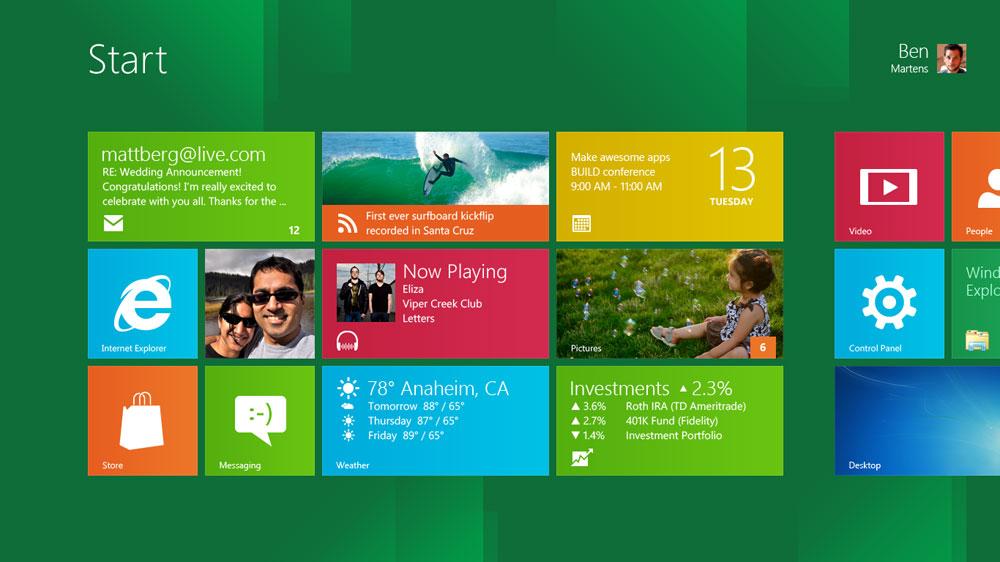As its next-generation tablet lineup prepares to hit the consumer market, Microsoft has tacked on an optional Companion Device License (CDL) to the existing Software Assurance (SA) volume licensing agreement for Windows 8, which enterprise customers will need to deploy desktop virtualization apps on non-Windows tablets, reports CRN.
Large corporations already covered by SA agreements will have to pay the additional fee if they want to use virtualization software, with each CDL license granting the use of up to four iPads or Android tablets.
The licensing change will not affect upcoming Windows RT tablets which will automatically receive licensing rights free of charge, according to Microsoft. Windows RT is the naming scheme given to devices that run on ARM processors rather than traditional x86 silicon which carry the basic monikers "Windows 8" and "Windows 8 Pro."
"These rights will provide access to a full VDI image running in the datacenter which will make Windows RT a great complementary tablet option for business customers," said Erwin Visser, senior director in the Windows Commercial Group.
The move will make it more expensive for larger entities already invested in multi-year licenses for Microsoft software to employ tablets. Customers that do not already have SA commitments may benefit from the new CDL, however, as Microsoft's Virtual Desktop Access (VDA) license costs $100 per device per year.
Source: Microsoft
In order to access a company's Windows environment, tablets need to run desktop virtualization software like offerings from Citrix or VMWare. Currently, SA "Roaming Rights" are thought to be restrictive and don't apply to individually-owned devices. Microsoft's FAQs say that Roaming Rights are limited to "a device that is not controlled, directly or indirectly, by you or your affiliates (e.g., a third party's public kiosk)." Going further, these devices can only connect to public networks like those found at cafes.
The restrictions impacted virtualization app makers but not Microsoft as they didn't have competing technology at the time. Now that the Redmond-based company is ready to enter the tablet market with Windows 8, the Virtual Desktop Infrastructure (VDI) has been reconfigured to allow for a more relaxed set of rules.
"The SA Roaming Right rules never hurt Microsoft much, because it didn't sell a competitive tablet with an embedded OS," said Paul DeGroot, principal analyst at Microsoft licensing consultant Pica Communications. "But when it does — when Windows RT devices hit the street — the SA Roaming Right restrictions suddenly disappear, and remote access to VDI from company-owned or personally owned devices over company networks is OK."
Apple's iPad has seen tremendous growth in both the consumer and enterprise markets, and some analysts estimate that the tablet will one day outperform the PC market as a whole. Microsoft's first Windows 8 tablets are expected to arrive this fall.
 Mikey Campbell
Mikey Campbell

-m.jpg)






 Wesley Hilliard
Wesley Hilliard
 Andrew O'Hara
Andrew O'Hara
 Malcolm Owen
Malcolm Owen
 Marko Zivkovic
Marko Zivkovic

 Chip Loder
Chip Loder
 Christine McKee
Christine McKee
 William Gallagher
William Gallagher



-m.jpg)





80 Comments
What a surprise, Microsoft leveraging their illegally obtained monopoly to stifle innovation and force their overpriced crap software on everyone.
Once again, there's that microsoft tax you pay for buying any microsoft products. Since they can't compete on product, then they are going to make money from competitors products. What a shame… Cheers !
I think something's going to have to give. An employee will most likely have a personal iPad already and to expect a company to make an additional expense and buy yet another tablet just to do a remote-desktop is pushing it.
Makes no sense. If I have a desktop PC running a licensed version of Windows8, then why should Microsoft care what kind of device I use to access that desktop PC? Of course, I can already smell the putrid aroma of iHaters spinning this to apply to Apple's app store and walled-garden whining which is not even the same thing.
I think the reality is Microsoft will get so much heat from it from everyone that they will lift that licensing restriction.
I think the biggest weapon Windows 8 for arm will bring is a full Microsoft Office Suite. That's pretty much it though. I know I don't like using my iPad at the office though, there isn't a decent filemanager that allows me to mount multiple server or NAS drives. No Java, Python support, I work for a bank and all of out frontend stuff runs on them. I really hope Apple releases a more OSX like version of iOS for business use.
I wouldn't hold your breath, remember that Microsoft also sales the server software that will give more functionality to these devises.